
Forest fires, deliberate in some cases, finish off native plants
The Nilgala herbal forest in the Monaragala District from where medicinal plants are obtained for Ayurvedic treatments was among several areas from where wildfires were reported this week.
Forest fires, mostly in parts of the Baddulla and Monaragala Districts destroyed plants and animals as well as endemic and rare plants.
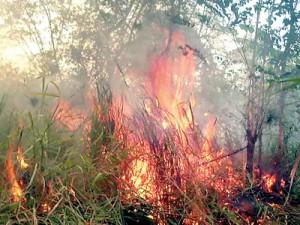
Forest fires destroy endemic and rare plants. Pic by Sumanasiri Gunathilake
Adviser of the Uva Provincial Department of Ayurveda, Piyal Marasinghe, said highly valued medicinal plants could become extinct if such wildfires caused by humans continued.
“Although large medicinal trees such as Bulu, Nelli and Aralu survive these fires, rare herbal plants like Vanaraja, Kadulessa, Bin Kohomba suffer significant damage during July and August when forest fires are more common,” he said.
He said herbs such as Bin Kohomba which are effective in treating viral flu and threatened species including Duhudu have been destroyed in forest fires reported in the Nilgala forest.
According to a report by the Forest Department last year, fires had damaged more than 2,300 hectares (5,683 acres) of forest cover. This year, Monaragala and Badulla were the worst affected. Last year, 469.9 hectares (1,161 acres) and 229 hectares (565 acres) of forest cover was affected in Badulla and in Monaragala districts respectively.
This year, an estimated 161 ha (400 acres) have been destroyed in forest fires in the Monaragala District.
Districts such as Matale and Kandy which were severely affected by forest fires last year with about 257.8 ha (637 acres) and 240.3 Ha (593 acres) respectively, they have not yet been significantly affected this month. However, district officials predict more fires, especially during August.
A few other incidents were also reported at the beginning of this month in Anuradhapura District.
A H Ravindra Kumara, assistant director of the disaster management unit, Monaragala District, said the dry spell is the major reason for the rapid spread of the fires.
At the time we were speaking to him on Thursday evening, he said out of the four forest fires reported on Wednesday, two had been doused with the assistance of the area residents, forest conservation officials and the army while the other two in Kotabowa shrub jungle and Kumbukkana Kalawalaragama reserve had not been doused.
Please turn to Page 13
Mr Kumara said some fires are set deliberately, while there also are instances of negligence.
“Poachers set fire to forests to trap animals. One trick is to set fire from one side and wait at the other side to catch them, or sometimes they catch the animals that come to eat the tender grass that grow after a fire,” he said. He added that there were also instances when people set fire to illegally grab land that belongs to reserves and forests.
Sand miners are another group largely responsible for fires on slopes and hilly areas, Mr Kumara said. He said that when vegetation on slopes are set alight in the dry season by sand miners, the sand washes off to the rivers in the rainy season. “This allows the miners to extract more sand from river beds,” he explained.
Illegal cannabis growers also often set fire to grasslands. Then they grow cannabis plants which are concealed amid tall grasses such as mana.
According to him, forest fires are common in Obbegoda, Kumbukgoda, Buththala and Wellawaya.
E M L Udaya Kumara, assistant director of Badulla District Disaster Management Coordination Unit said about five forest fires are reported to him every day.
He said forest fires are common in Hali Ela, Ella, Bandarawela, Koranathota, Meegahakiul, and Lunuwela areas.
Hali Ela Divisional Secretary in Badulla said more than 32 ha of forests had been destroyed in the Hali Ela divisional secretariat alone this month while many small patana areas too, had been affected due to fires.
Mr Kumara said illegal loggers and game hunters are setting fires along with livestock owners who try to clear the land to regenerate grass for their herds. But there are also arsonists seeking cheap thrills.
“Usually those who intentionally set fires do so in the evenings or at the night especially on Saturdays and Sundays,’’ he said.
He said water catchment areas, commercial plantations, forest plantations and even business ventures, schools, water lines suffer damage.
Environmentalists claim that all fires are caused by Sri Lankans.Supun Lahiru Prakash, president of the Biodiversity Conservation and Research Circle, said forest fires destroy many endemic species. “We have found monkeys, loris and pangolin trapped in fires,” he said.
One adverse outcome is the spread of invasive species when native species are destroyed in fires.
Mr Prakash said the destruction alters the climate and the hydrological cycle.
He said the capacity of rivers is also reduced when silt builds up due soil erosion. Agricultural lands are damaged as well.
Meanwhile, Nanda Kumara, conservator of forests, protection and law enforcement of the Forest Department, said efforts are underway to reduce forest fires.
They include awareness programmes among the public and school children, forest restoration, deploying watchmen and creating fire belts. In some forests, a 22 foot wide portion has been removed to prevent fires from burning deep into the interior areas.
Source – 23/07/2017, The Sunday Times, See more at – http://www.sundaytimes.lk/170723/news/forest-fires-deliberate-in-some-cases-finish-off-native-plants-251519.html
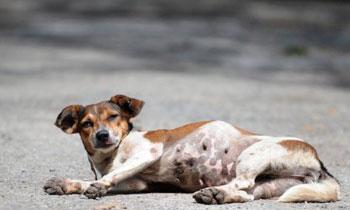
Police begin probe on Moratuwa Uni’s animal ‘killing’
Police have launched an investigation following a charge by animal rights activists that stray dogs and cats had been eliminated at the Moratuwa University last Friday. Vice Chancellor Ananda Jayawardene said police recorded his statement and statements from security personal of the University.
“The university did not encourage the killing of dogs but only wanted the dogs removed from the lecture halls, canteens and laboratories as they were a nuisance,” he said. He said he was not aware that the security personnel had used sedatives on the animals when they were instructed only to remove the animals in a humane manner. “Last Saturday I got to know that the dogs had been injected sedatives and two had died in the process,” he said.
An animal rights activist and founder of Ray of Hope, Iraki Lankika Koddituwakku said that security personnel had no expertise regarding the removal of strays and that they had committed a sinful act by injecting Ketamine to 20 dogs and cats . Another activist Wiboda Abegoda said they have lodged complaints at the Moratuwa and Homagama police stations to take action against those responsible for the killings.
Meanwhile, lawyer and animal rights activist Lalani Perera called for repeal of the 1907 Prevention of Cruelty to Animals Ordinance and the introduction of fresh legislation, pointing out that under the existing law, the crime of cruelty to animals carried a meagre fine of Rs. 100.
Source – 23/07/2017,The Sunday times, See more at – http://www.sundaytimes.lk/170723/news/police-begin-probe-on-moratuwa-unis-animal-killing-251697.html
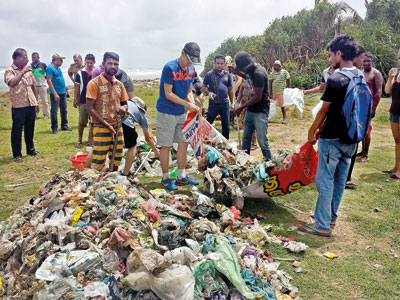
Joining hands to eradicate dengue
Government, villagers and non-government organizations have launched a multiplicity of programmes aimed at clearing garbage in an effort to minimise the spread of dengue.
Last week a group of foreign university students visiting the country joined hands with locals to clean up a stretch of beach in Moratuwa.
The foreign students, together with students from the Moratuwa University and workers from the Moratuwa Municipal Council joined hands to clean up a 500-metre stretch of sea shore.
Students from a host of countries, comprising students from China, Sweden, South Korea, Germany, Belgium, France and Turkey participated in the cleanup effort.
The campaign revealed a number of breeding sites of the dengue mosquito which were destroyed.
Plastic bottles, polythene bags and other recyclable materials were collected separately and sent for recycling.
Story and pix by Reka Tharangani Fonseka
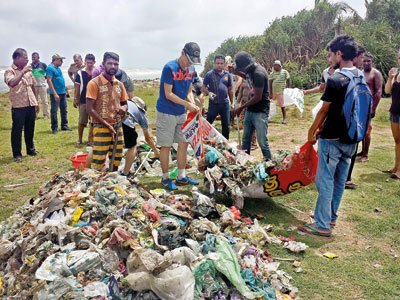
Foreign university students joined in clearing a 500- metre stretch of beach at Moratuwa
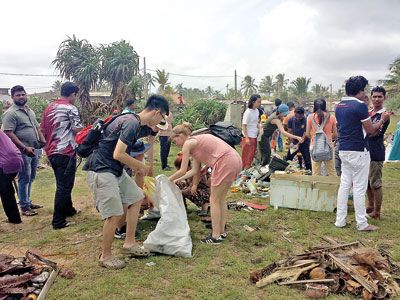
Can we be civic-minded enough to ensure our beaches are not polluted after the clean up
Source – 23/07/2017 , The Sunday Times, see more at – http://www.sundaytimes.lk/170723/news/joining-hands-to-eradicate-dengue-251474.html
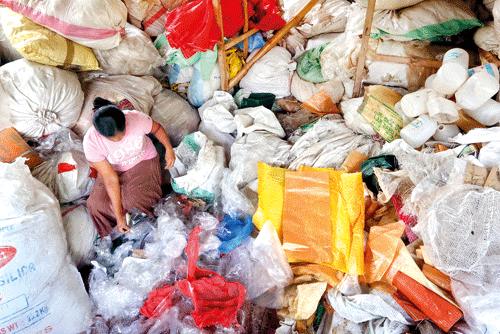
Think plastic, think creative
A recycling and upcycling plant in Katana is lending a hand to save our planet one plastic bag at a time
Where others see waste they see potential.
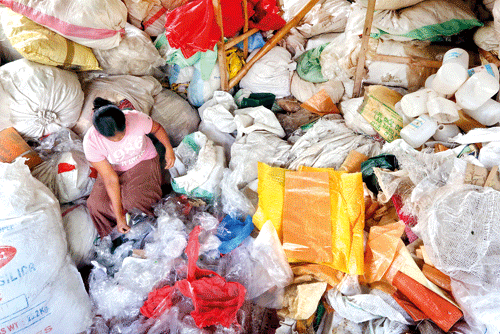
Recycling: Sorting out the plastic (top) and (right). Pix by M.A. Pushpa Kumara
At the unassuming property that is No. 102/1 West Kaluwarippuwa Road, Katana, you will find a plastic recycling and upcycling plant that is serving the community of Katana. Co-owned by Jayantha Kumarasiri and Akvan Gajanayake, the operation is run by Jayantha who decides how best to use the material he obtains. Gunny bags and old curtains are used to make beautiful files which he feels would probably last twice as long as the standard plastic files Sri Lankans use.
Jayantha started working at a plastic manufacturing plant, after school and higher studies learning a great deal about manufacturing polythene. He learnt the process of injection moulding plastic at another factory before learning of the recycling process. Becoming factory manager of a recycling plant later on, he saw that they used plastic imported from Saudi Arabia to be recycled. “I thought then we can use our own plastic,” he says. He then started collecting plastic on his own and sending it to recycling plants. While working as a manager at a factory in Galle, he met Akvan through the Environmental Foundation (where Akvan was working at the time) and later, after purchasing the equipment from a recycling plant which was being shut down, they opened their own plant.
Today, the plant produces recycled plastic pellets and has recently started producing upcycled products. “The upcycling process is very creative and the team designs different things daily,” Jayantha says.
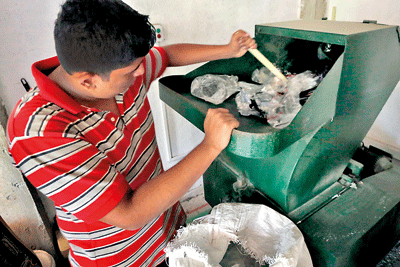 The recycling process is long. First the plastic which is collected (from corporations and households at a fee) is sorted according to density. Then it is crushed into rough pieces a few millimetres long using a shredder. Next it is sent through a compactor which transforms it into lumps. The lumps are crushed again to reduce the size and sent through an extruder which converts it into strings of plastic which look like an endless plastic rope. This rope is finally sent through a pelletizer and the final plastic pellets are sold.
The recycling process is long. First the plastic which is collected (from corporations and households at a fee) is sorted according to density. Then it is crushed into rough pieces a few millimetres long using a shredder. Next it is sent through a compactor which transforms it into lumps. The lumps are crushed again to reduce the size and sent through an extruder which converts it into strings of plastic which look like an endless plastic rope. This rope is finally sent through a pelletizer and the final plastic pellets are sold.
While they used to be sold for a reasonable price, Jayantha tells us that now prices have gone down. “Plastic is a by-product of petroleum. This means that when the petrol prices increase, the price of our pellets also increases. We used to sell them for good prices. Now the plastic price has gone down because the price of petroleum has reduced,” he notes. The price of virgin plastic pellets is directly affected by the price of petroleum which in turn affects the price of recycled plastic pellets. What saddens him is the fact that they cannot manufacture a final product from plastic pellets because of the lack of machinery, something he hopes he will to do in the future. He also hopes to set up a plastic research and development centre in the future. Jayantha is grateful to Akvan for all the help he has received. “Akvan has helped me with this project a lot and I am thankful that he is there with me on this project” he says.
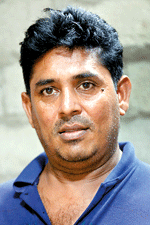
Jayantha Kumarasiri
Helping Jayantha recycle plastic are villagers from the area. Dilrukshika Niroshani, 36, lives ten minutes away and with two children aged 16 and 8, she finds this job very convenient. “We can tell Jayantha Aiya and leave early or take a day off if we need to attend to our children, and we get paid according to what we sort so it’s easy for us,” she says. T.P.G. Pushpa, 52, who has been there from the inception, also has the convenience of living close by. They have both stopped burning plastic at home – a harmful practice they used to engage in before they started working at the plant. Now they bring the plastic to be recycled and have educated their children on the harmful effects of plastic. “They are the experts at sorting– they know what to do and exactly how we want it,” says Jayantha. They also help with the upcycling process – transforming waste into beautiful products.
Upcycling is the process of taking discarded plastic and converting it into better quality products which can be reused. A much simpler process than recycling, this project is a collaboration of the Universities of Western Australia, Moratuwa, Sri Jayewardenepura and Jaffna alongside the Australian organisation Waste for Life. The University of Western Australia taught Jayantha and the Lankan universities how to upcycle and the machinery required was also given through this collaboration. “Without any expectations they (the University of Western Australia) spent their own money and let us use their patents and helped us so much,” he says, adding that they even trained the workers.
“We were taught to use the plastic outside and the fabric inside, but as the quality of the plastic is sometimes not that good we had discolouration of the files occasionally, so we tried keeping the plastic inside which was much more successful,” Jayantha says. Always ready to innovate, he is now looking into making covers for electronic devices such as laptops and tablets and purses for weddings etc.
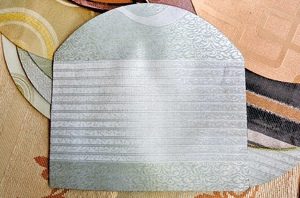
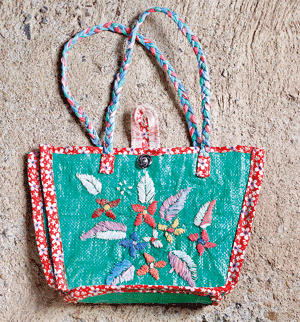
Upcycling: Some of the creative products made at the plant
Jayantha, Dilrukshi and Pushpa all agree that people need to be more educated about the harmful effects of plastic. “We can produce much more recycled plastic if people would give us more plastic,” he says. Though they see the plastic recycling plant, people still throw plastic on the road, which shows their lack of discipline, Dilrukshi feels. “Api gewala ganna hinda apita dunna nam hondai (because we pay and take it if people gave it to us, that would be great),” Pushpa adds. There is a lack of understanding, Jayantha says, “sometimes people give us plastic with remnants of food and we cannot use them because cleaning that is not profitable.”
“This factory will be a good opportunity for Municipal Councils in the Gampaha district to give their waste polythene to be recycled, especially since garbage disposal has become a big problem,” Akvan says.
Walk out of No. 102/1 West Kaluwarippuwa Road, Katana and instead of the plain grey walls, your mind’s eye will see the potential it holds – the waste it takes in and turns into something quite beautiful – helping save the planet one plastic bag at a time.
Source – 23/07/2017, The Sunday Times, See more at – http://www.sundaytimes.lk/170723/plus/think-plastic-think-creative-251191.html
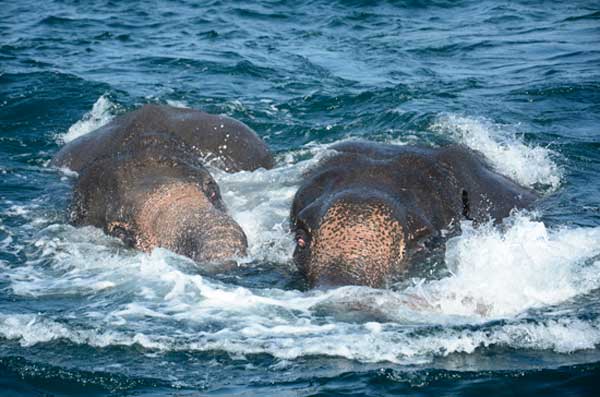
Navy rescues 2 more jumbos from sea
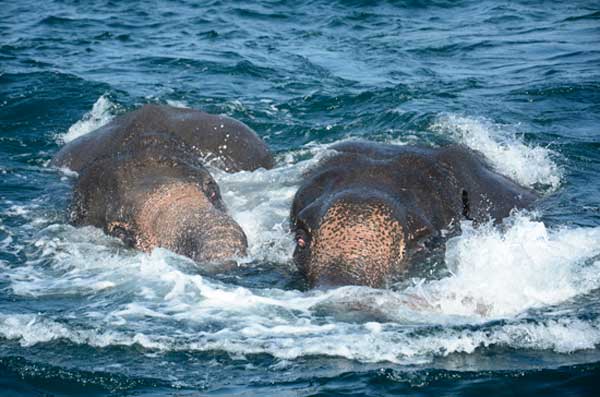
A group of naval personnel attached to the Eastern Naval Command had rescued two elephants that were swept out to the sea, in between Round Island and Foul Point, Trincomalee this morning.
Source – 23/07/2017, DailyMirror, see mora at – http://www.dailymirror.lk/article/Navy-rescues-more-jumbos-from-sea-133322.html

Sri Lanka moves to generate electricity from garbage
The government is set to initiate three projects in the Western Province next month to generate electricity using municipal solid waste.
The initiative forms the basis of measures to find a permanent solution to the festering garbage crisis in urban areas.
President Maithiripala Sirisena and Prime Minister Ranil Wickremesinghe spearheaded the move to find permanent solutions to the existing issue surrounding garbage.
As a result, President Sirisena appointed a three member task force, headed by Ministers Champika Ranawaka, Faiszer Musthapha and Western Province Chief Minister Isura Devapriya to pilot the project in the Western Province and specifically Colombo.
“With international support, with the use of latest technology, we will solve this crisis so that it will no longer a problem for any future leader or a government.
“Today, we see protests, but no one offers solutions…,” President Sirisena said at a function held during the weekend.
He added that he was monitoring progress every two weeks of a committee to deal with the problem of garbage disposal. No previous government had given such priority to this issue,” he said.
Prime Minister Wickremesinghe who addressed UNP officials who helped his political career which began from the Biyagama electorate 40 years ago, spoke of the waste disposal crisis and the government’s initiative to resolve it.
Megapolis and Western Development Minister Patali Champika Ranawaka said the government has found permanent solutions to the piling garbage crisis that remained unresolved by successive governments for decades.
“We will start three projects next month in the Western Province to generate electricity using garbage,”the minister said while launching a 30-million rupee railway square in Ella over the weekend.
He said the previous administration boasted that it deployed the army and did not allow even a toffee wrapper to be dropped in the city of Colombo. However, the reality was that they haphazardly dumped garbage at Meethotamulla leading to the April tragedy when nearly 40 people died after a mountain of rubbish collapsed on them.
The minister said unlike the previous government, the new administration did not deploy troops to clear the garbage that had piled up in the city, but the municipal sanitary workers had been used for the job.
“We no longer pile up garbage. Out of the 700 tonnes of garbage generated in Colombo, 300 tonnes are being turned into compost. Another 100 tonnes is being recycled.
“We are going to improve this even further. To permanently solve the garbage crisis in the country, we are building a sanitary landfill in Aruwakkalu (in Puttalam district),” the minister said.
http://www.dailynews.lk/2017/07/24/local/122947/sri-lanka-moves-generate-electricity-garbage

OVER 3,000 TANKS in A’pura RUN DRY
As the drought continues, officials warn that close to 3,000 small and large scale tanks out of 3,226 tanks in the Anuradhapura
district have dried up. The remaining tanks have had their water levels reduced by 90-97 percent. The dire situation has caused
difficulties to many in the district to meet their daily water requirements.
Pictures by Amila Prabath Wanasinghe
Source – 21/07/2017, Daily News, See more at – http://www.dailynews.lk/2017/07/21/local/122757/over-3000-tanks-%E2%80%99pura-run-dry
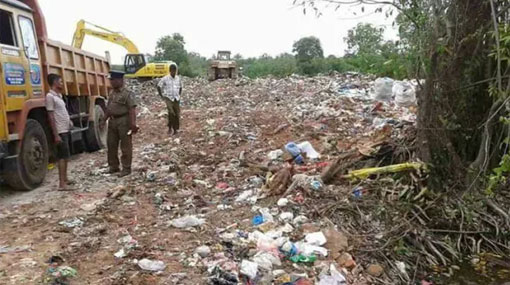
Court extends ban on dumping garbage in Muthurajawela

The Supreme Court on Thursday extended the order prohibiting the Colombo Municipal Council (CMC) from disposing garbage at Muthurajawela till July 25.
A petition was filed by several residents in the area seeking a court order against the disposal of garbage collected from the city of Colombo at the Muthurajawela site.
The petition states that waste is being disposed in Muthurajawela despite the area being named an Environmental Conservation Zone, and that this has resulted in several environmental and health issues surfacing.
On July 05, the court had issued an injunction order prohibiting the Colombo Municipal Council (CMC) from disposing garbage in Muthurajawela till today (July 20).
Source – 20/07/2017, Ada Derana, see more at – http://www.adaderana.lk/news/42058/court-extends-ban-on-dumping-garbage-in-muthurajawela
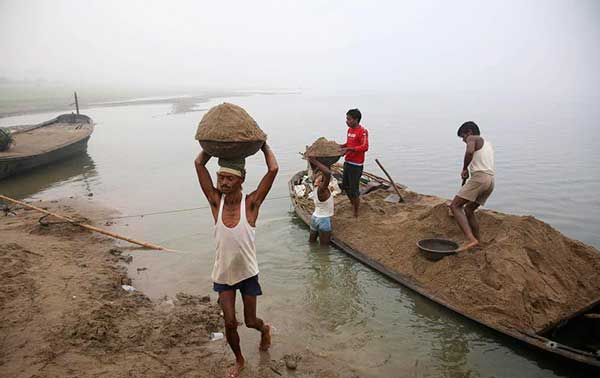
Sand mining a major problem

Illegal sand mining has become major problem in the Northern Province. A shortage of sand is prevailing in the North as several construction projects are in progress. Due to this, the price of sand has shot up.
One tipper of sand which was purchased at Rs 17,000 during the pre-2009 period, now costs Rs 40,000, affected people said.
Sand is being continuously mined in Thoththavadi, Illupaikadavai, Koorai, Madu, Palampidy, Aruvaiyaaru and Kallaru in Mannar.
The additional District Secretary of Mannar said that the Department of Geology in Anuradhapura has issued permits to mine sand in these areas.
However, people have faced several problems when mining for commercial purposes in breach of conditions laid down in the permits.
Meanwhile, although no permits have been issued for sand mining on the Jaffna-Thenmarachchi- Kachchai beach, large scale sand mining is conducted during the night hours.
People have further expressed their concerns over sand mining to a depth lower than the Mean Sea Level, as the villages close by are facing a risk of sea erosion. It has been pointed out that the Government should intervene. (MT)
(MT)
Source – 19/07/2017, Ceylon Today, See more at – http://www.ceylontoday.lk/article20170401CT20170930.php?id=5727

Curse called polythene

Responding to the Cabinet’s approval of banning the production, sale and use of lunch-sheets, polythene and Styrofoam/Rigifoam, the Colombo Municipality (CMC) yesterday said the move would reduce at least one third of the waste collected in the city.
The CMC Waste Management Director Ms. Yogarani Sylvester speaking to the Daily Mirror said the ban would be the only solution to tackle the non-recyclable waste collected within the city.
 “Lunch sheets are not things that we can recycle nor are they degradable. Most of these lunch sheets and Styrofoam/ boxes in which lunch is sold are soiled so they can’t be reused. This is a major problem as we can’t do anything with them,” she said.
“Lunch sheets are not things that we can recycle nor are they degradable. Most of these lunch sheets and Styrofoam/ boxes in which lunch is sold are soiled so they can’t be reused. This is a major problem as we can’t do anything with them,” she said.
 While the move does not mean the garbage problem in the city would be completely resolved it would have a significant impact on the garbage in the city. “People will start to reuse what they have, which is a significant decrease in the amount of garbage that is collected as we come back with at least 20 polythene bags when we go to the super market when we can just use two,” Ms. Sylvester stated.
While the move does not mean the garbage problem in the city would be completely resolved it would have a significant impact on the garbage in the city. “People will start to reuse what they have, which is a significant decrease in the amount of garbage that is collected as we come back with at least 20 polythene bags when we go to the super market when we can just use two,” Ms. Sylvester stated.
The proposal by the Central Environmental Authority (CEA) will see the ban of lunch sheets, polythene and Styrofoam banned from September with authorities expected to introduce and promote degradable polythene and bags to the public.
The media also reported that the import and production of lunch sheets, containers, plates, cups and spoons made of polythene and the sale of cooked meals in polythene containers and the burning of plastic in open areas will be prohibited.
Authorities will also take measures to introduce and provide paper, cloth, reed bags or bio-degradable plastic.
Source – 17/07/2017, Daily Mirror, see more at – http://www.dailymirror.lk/plus/article/Curse-called-polythene-132957.html





